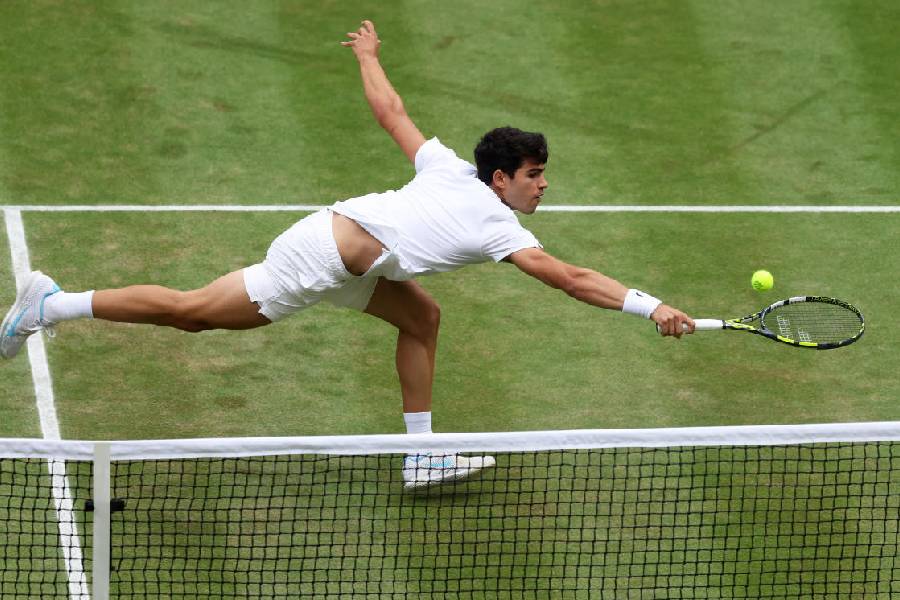Defending champion Carlos Alcaraz beat Daniil Medvedev 6-7 (1), 6-3, 6-4, 6-4 on Friday to return to the Wimbledon final as he seeks his fourth grand slam title at the age of 21.
In the second semi-final, seven-time Wimbledon champion Novak Djokovic produced some of his best tennis to outclass Italian 25th seed Lorenzo Musetti 6-4, 7-6 (7-2), 6-4 and reach a 10th Wimbledon final, where he will meet Alcaraz in a mouthwatering 2023 rematch.
Djokovic, the 24-time grand slam winner, mixed up his game by serving and volleying to leave Musetti on the ropes, before staving off a late comeback attempt from the Italian to save a breakpoint and prevail on his fourth matchpoint when the Italian sent a shot long.
Energetic Spaniard
After an average opening set, Alcaraz transformed back into the energetic, attacking, crowd-pleasing force who already was the first teenager to be No. 1 in the ATP rankings and is the youngest man to have won a major trophy on three surfaces: grass, clay and hard courts.
Now the Spaniard is one victory away from joining Boris Becker and Bjorn Borg as the only men in the Open era, which began in 1968, with multiple championships at the All England Club before turning 22.
He could also become just the ninth man in the Open era to retain the Wimbledon title — after Djokovic, Rod Laver, John Newcombe, Bjorn Borg, John McEnroe, Boris Becker, Pete Sampras and Roger Federer.
Alcaraz also triumphed at the US Open in 2022 and the French Open last month.
A year ago at Wimbledon, Alcaraz eliminated 2021 US Open champion Medvedev in straight sets in the semi-finals before defeating Djokovic in five sets in the final.
This time, on a cloudy afternoon at Centre Court, the No. 3-seeded Alcaraz went through some ups and downs against No. 5 Medvedev, a 28-year-old from Russia who was trying to get to the seventh grand slam title match of his career.
Medvedev grabbed an early 5-2 lead, then got into trouble with his play and his temper.
Alcaraz broke to get within 5-4 with a drop shot that chair umpire Eva Asderaki ruled — correctly, according to TV replays — bounced twice before Medvedev got his racquet on the ball.
He appeared to curse afterward, and Asderaki, after climbing down from her seat to huddle with tournament referee Denise Parnell during the ensuing changeover, issued a warning to Medvedev for unsportsmanlike conduct.
He regrouped quickly and was just about perfect in that set’s tie-breaker. His own defensive abilities combined with some strong serving and a return winner to take it relatively easily.
Then it was Alcaraz’s turn to get headed in the right direction, which didn’t take long.
Three forehand errors by Medvedev translated into a break for Alcaraz and a 2-1 lead in the third set, accomplished with a backhand winner.
Alcaraz got the last break he would need for a 4-3 edge in the fourth when Medvedev sailed a backhand long, then sat in his sideline chair, locked eyes with his two coaches up in the stands and started muttering and gesticulating.
That’s what Alcaraz can do to an opponent.
Of the match’s 28 forehand winners, 24 were produced by Alcaraz. That is hardly the kid’s lone skill. He was terrific at the net, whether serve-and-volleying or otherwise, winning 38 of the 53 points when he moved forward.
As dangerous as Alcaraz can be at his aggressive best, his defence is something to marvel at, too.
At times, it feels as though an exchange is never over until he decides it is. And if it appears that way from the comfort of the stands, just imagine how frustrating that must be for foes.
While Alcaraz’s winning-performance was initially celebrated by an adoring Centre Court crowd, he was briefly booed in his on-court interview for his view on Sunday’s Euro 2024 final between England and Spain.
“It will be a good day for Spain as well,” Alcaraz said when asked to look ahead to his own final. Smiling, he added: “I didn’t say Spain are going to win but I say it will be a fun, fun day.”










